Tuesday Poster Session
Category: Liver
P3890 - Necrotizing Sarcoid Granulomatosis With Hepatic Involvement and Non-Cirrhotic Portal Hypertension
Tuesday, October 24, 2023
10:30 AM - 4:00 PM PT
Location: Exhibit Hall

Has Audio
- VJ
Vivek V. Jasti, MD
OhioHealth Riverside Methodist Hospital
Columbus, OH
Presenting Author(s)
Vivek V. Jasti, MD1, Adam J. Hanje, MD2
1OhioHealth Riverside Methodist Hospital, Columbus, OH; 2Ohio Gastroenterology Group, Inc., Columbus, OH
Introduction: Sarcoidosis commonly involves the liver and is often asymptomatic, but severe liver dysfunction may occur. Necrotizing sarcoid granulomatosis (NSG) is a rare variant with few cases describing liver involvement.
Case Description/Methods: A 44-year-old Caucasian female presented with dyspnea and a 50 lb weight loss. CT chest on admission revealed bilateral interstitial pulmonary nodular infiltrates, hepatosplenomegaly (HSM), and numerous liver and splenic nodules. Outpatient liver biopsy showed necrotizing granulomatous inflammation. She was readmitted 2 weeks later for emesis and jaundice. Liver function testing (LFTs) showed ALP 1080, AST 138, ALT 78, and total bilirubin 4.6. Infectious workup, including fungal and mycobacterial etiologies, and autoimmune workup was negative. Angiotensin converting enzyme was elevated at 182 (U/L). Steroids were started on hospital day 3. She had mild improvement and was discharged on hospital day 7 with 40mg prednisone. LFTs began trending down 2 weeks after starting steroids and normalized within 6 weeks. Methotrexate (MTX) was added 5 weeks after discharge. Follow up outpatient imaging revealed HSM and ascites, confirming portal hypertension (PHT). Lasix 40mg and spironolactone 100mg were started. Follow up biopsy, 11 months later, showed absence of granulomas and no difference in hepatic venous pressure gradients, indicating resolution of PHT. She has remained on a prolonged steroid taper.
Discussion: Sarcoidosis is a systemic granulomatous inflammatory disease. The lungs are frequently implicated but almost any organ can be affected. Hepatic involvement has been reported in 50-65% of cases, but postmortem studies reported higher prevalence. Hepatic sarcoidosis is often asymptomatic, but fatigue, fever, abdominal pain, HSM, or cholestatic liver injury may occur. Jaundice, cirrhosis, and non-cirrhotic PHT are rare occurrences.
Although granulomas are classically non-necrotizing, NSG is a rare form of sarcoidosis with features of necrosis and granulomatous vasculitis. Diagnosis requires pathologic examination and ruling out other causes of granulomatosis, such as infection and autoimmune disease. NSG’s relationship to classical and nodular sarcoidosis is controversial. Cases of NSG with hepatic involvement are exceedingly rare, a 2015 study identified 92 cases of NSG since being first described in 1973 with only 1 case of hepatic involvement. Treatment consists of steroids, ursodiol, or immunosuppressive agents such as azathioprine, MTX, or TNF-a inhibitors.
Disclosures:
Vivek V. Jasti, MD1, Adam J. Hanje, MD2. P3890 - Necrotizing Sarcoid Granulomatosis With Hepatic Involvement and Non-Cirrhotic Portal Hypertension, ACG 2023 Annual Scientific Meeting Abstracts. Vancouver, BC, Canada: American College of Gastroenterology.
1OhioHealth Riverside Methodist Hospital, Columbus, OH; 2Ohio Gastroenterology Group, Inc., Columbus, OH
Introduction: Sarcoidosis commonly involves the liver and is often asymptomatic, but severe liver dysfunction may occur. Necrotizing sarcoid granulomatosis (NSG) is a rare variant with few cases describing liver involvement.
Case Description/Methods: A 44-year-old Caucasian female presented with dyspnea and a 50 lb weight loss. CT chest on admission revealed bilateral interstitial pulmonary nodular infiltrates, hepatosplenomegaly (HSM), and numerous liver and splenic nodules. Outpatient liver biopsy showed necrotizing granulomatous inflammation. She was readmitted 2 weeks later for emesis and jaundice. Liver function testing (LFTs) showed ALP 1080, AST 138, ALT 78, and total bilirubin 4.6. Infectious workup, including fungal and mycobacterial etiologies, and autoimmune workup was negative. Angiotensin converting enzyme was elevated at 182 (U/L). Steroids were started on hospital day 3. She had mild improvement and was discharged on hospital day 7 with 40mg prednisone. LFTs began trending down 2 weeks after starting steroids and normalized within 6 weeks. Methotrexate (MTX) was added 5 weeks after discharge. Follow up outpatient imaging revealed HSM and ascites, confirming portal hypertension (PHT). Lasix 40mg and spironolactone 100mg were started. Follow up biopsy, 11 months later, showed absence of granulomas and no difference in hepatic venous pressure gradients, indicating resolution of PHT. She has remained on a prolonged steroid taper.
Discussion: Sarcoidosis is a systemic granulomatous inflammatory disease. The lungs are frequently implicated but almost any organ can be affected. Hepatic involvement has been reported in 50-65% of cases, but postmortem studies reported higher prevalence. Hepatic sarcoidosis is often asymptomatic, but fatigue, fever, abdominal pain, HSM, or cholestatic liver injury may occur. Jaundice, cirrhosis, and non-cirrhotic PHT are rare occurrences.
Although granulomas are classically non-necrotizing, NSG is a rare form of sarcoidosis with features of necrosis and granulomatous vasculitis. Diagnosis requires pathologic examination and ruling out other causes of granulomatosis, such as infection and autoimmune disease. NSG’s relationship to classical and nodular sarcoidosis is controversial. Cases of NSG with hepatic involvement are exceedingly rare, a 2015 study identified 92 cases of NSG since being first described in 1973 with only 1 case of hepatic involvement. Treatment consists of steroids, ursodiol, or immunosuppressive agents such as azathioprine, MTX, or TNF-a inhibitors.
Disclosures:
Vivek Jasti indicated no relevant financial relationships.
Adam Hanje: Intercept – Speakers Bureau. Salix – Speakers Bureau.
Vivek V. Jasti, MD1, Adam J. Hanje, MD2. P3890 - Necrotizing Sarcoid Granulomatosis With Hepatic Involvement and Non-Cirrhotic Portal Hypertension, ACG 2023 Annual Scientific Meeting Abstracts. Vancouver, BC, Canada: American College of Gastroenterology.
